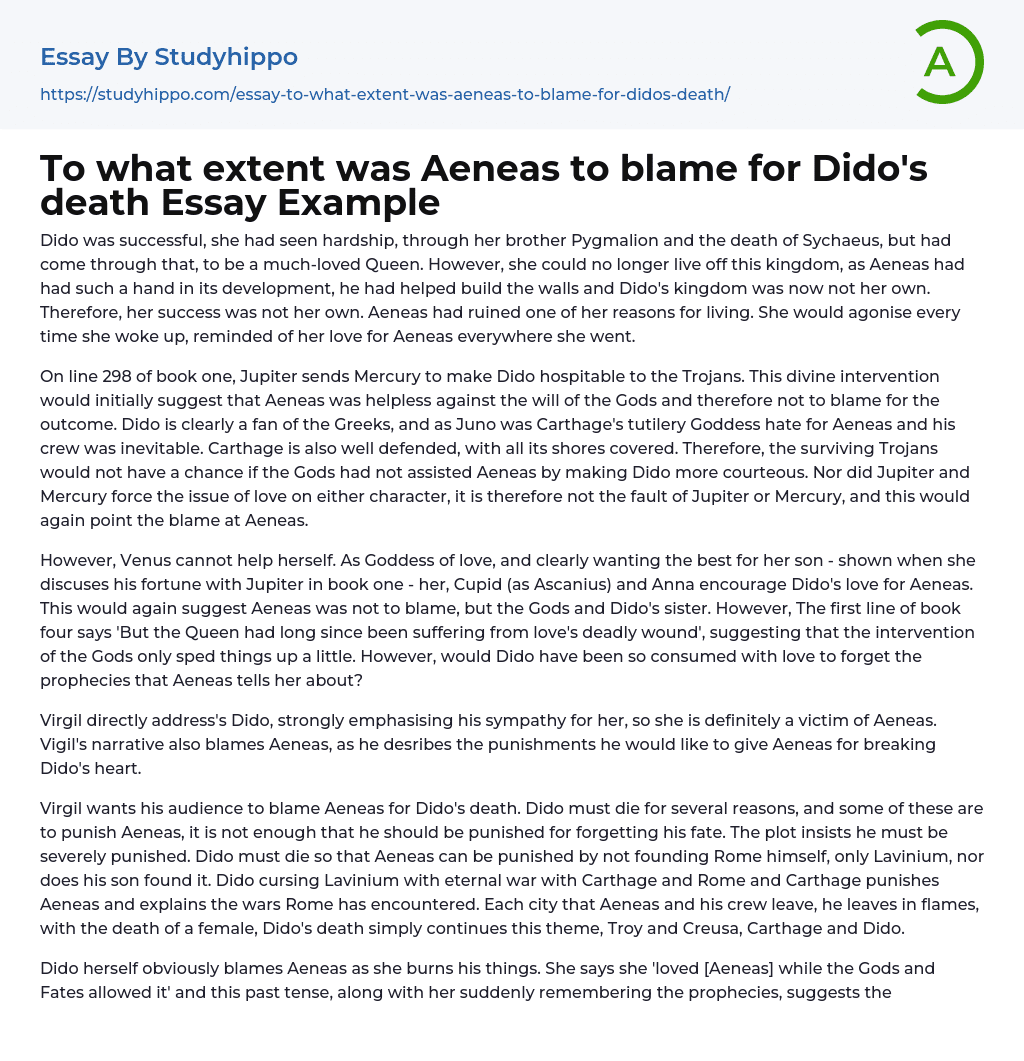

To what extent was Aeneas to blame for Dido’s death Essay Example
Dido was successful, she had seen hardship, through her brother Pygmalion and the death of Sychaeus, but had come through that, to be a much-loved Queen. However, she could no longer live off this kingdom, as Aeneas had had such a hand in its development, he had helped build the walls and Dido's kingdom was now not her own. Therefore, her success was not her own. Aeneas had ruined one of her reasons for living. She would agonise every time she woke up, reminded of her love for Aeneas everywhere she went.
On line 298 of book one, Jupiter sends Mercury to make Dido hospitable to the Trojans. This divine intervention would initially suggest that Aeneas was helpless against the will of the Gods and therefore not to blame for the outcome. Dido is clearly a fan of the Greek
...s, and as Juno was Carthage's tutilery Goddess hate for Aeneas and his crew was inevitable. Carthage is also well defended, with all its shores covered. Therefore, the surviving Trojans would not have a chance if the Gods had not assisted Aeneas by making Dido more courteous. Nor did Jupiter and Mercury force the issue of love on either character, it is therefore not the fault of Jupiter or Mercury, and this would again point the blame at Aeneas.
However, Venus cannot help herself. As Goddess of love, and clearly wanting the best for her son - shown when she discuses his fortune with Jupiter in book one - her, Cupid (as Ascanius) and Anna encourage Dido's love for Aeneas. This would again suggest Aeneas was not to blame, but the Gods and Dido's sister. However, The first
line of book four says 'But the Queen had long since been suffering from love's deadly wound', suggesting that the intervention of the Gods only sped things up a little. However, would Dido have been so consumed with love to forget the prophecies that Aeneas tells her about?
Virgil directly address's Dido, strongly emphasising his sympathy for her, so she is definitely a victim of Aeneas. Vigil's narrative also blames Aeneas, as he desribes the punishments he would like to give Aeneas for breaking Dido's heart.
Virgil wants his audience to blame Aeneas for Dido's death. Dido must die for several reasons, and some of these are to punish Aeneas, it is not enough that he should be punished for forgetting his fate. The plot insists he must be severely punished. Dido must die so that Aeneas can be punished by not founding Rome himself, only Lavinium, nor does his son found it. Dido cursing Lavinium with eternal war with Carthage and Rome and Carthage punishes Aeneas and explains the wars Rome has encountered. Each city that Aeneas and his crew leave, he leaves in flames, with the death of a female, Dido's death simply continues this theme, Troy and Creusa, Carthage and Dido.
Dido herself obviously blames Aeneas as she burns his things. She says she 'loved [Aeneas] while the Gods and Fates allowed it' and this past tense, along with her suddenly remembering the prophecies, suggests the divine intervention of Venus being overcome by Aeneas's fate, therefore this control Venus had, was not that strong - Dido had been too willing to love Aeneas. Often, Virgil uses intertextuality to suggest Dido as a witch, references to
Circe, and especially as Aeneas leaves, Calypso, plant an idea that Dido forces him to stay, making him forget as Circe did in the Odyssey through magic. This would explain why Aeneas is so quick to dismiss their love and marriage in favour of fate, as a greater power than Dido's reminds him.
In book six, Dido is in the Mourning Plains with Sychaeus. Therefore, her unhappiness in love outshines the fact she killed herself, because she would be in Limbo for suicide, and yet is not. This shows that Aeneas was to blame, as it is considered not her fault, Aeneas caused her unhappiness in love.
- Trojan War essays
- Apollo essays
- Iliad essays
- Achilles essays
- Odysseus essays
- Oedipus essays
- Hercules essays
- Myths essays
- Zeus essays
- Gilgamesh essays
- Creation Myth essays
- Creation Vs Evolution essays
- Apoptosis essays
- Asthma essays
- Black Death essays
- Breast Cancer essays
- Cholesterol essays
- Chronic essays
- Chronic Pain essays
- Death essays
- Diabetes essays
- Down Syndrome essays
- Epidemic essays
- Hypertension essays
- Infection essays
- Infertility essays
- Myocardial Infarction essays
- Pain essays
- Pathogen essays
- Pregnancy essays
- Sexually Transmitted Disease essays
- Symptom essays
- Tuskegee Syphilis Experiment essays
- Water supply essays
- American Literature essays
- Between The World and Me essays
- Book Report essays
- Book Review essays
- Book Summary essays
- Books essays
- Character essays
- Coming of Age essays
- Dante's Inferno essays
- Everyday Use essays
- Flowers for Algernon essays
- Genre essays
- Greek Mythology essays
- Incidents in The Life of a Slave Girl essays
- Letter essays
- Literary Criticism essays



